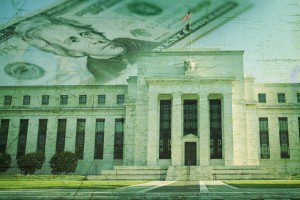 Simply put, banks are in business to make money – they profit by making money from our money. To ensure that this happens, most countries around the world have created a Central Banking system. Author G. Edward Griffin, in his classic work, The Creature from Jekyll Island, explains how these banking systems, and specifically how the Central Bank of the United States (the Federal Reserve), was created.
Simply put, banks are in business to make money – they profit by making money from our money. To ensure that this happens, most countries around the world have created a Central Banking system. Author G. Edward Griffin, in his classic work, The Creature from Jekyll Island, explains how these banking systems, and specifically how the Central Bank of the United States (the Federal Reserve), was created.
The following Q and A exchange, originally published on April 3rd, 1957 in the British humor magazine, Punch, is the introduction of The Creature from Jekyll Island. It will make you think twice about putting money into your bank account!
Punch: What are banks for?
Answer: To make money
P: For the customers?
A: For the Banks.
P: Why doesn’t bank advertising mention this?
A: It would not be in good taste. But it is mentioned by implication in references to reserves of $249,000,000 or thereabouts. That is the money that they have made.
P: Out of the customers?
A: I suppose so.
P: They also mention Assets of $500,000,000 or thereabouts. Have they made that too?
A: Not exactly. That is the money they use to make money.
P: I see. And they keep it in a safe somewhere?
A: Not at all. They lend it to customers.
P: Then they haven’t got it?
A: No.
P: Then how is it Assets?
A: They maintain that it would be if they got it back.
P: But they must have some money in a safe somewhere?
A: Yes, usually $500,000,000 or thereabouts. This is called Liabilities.
P: But if they’ve got it, how can they be liable for it?
A: Because it isn’t theirs.
P: Then why do they have it?
G: It has been lent to them by customers.
P: You mean customers lend banks money?
A: In effect. They put money into their accounts, so it is really lent to banks.
P: And what do banks do with it?
A: Lend it to other customers.
P: But you said that money they lent to other people was assets?
G: Yes.
P: Then Assets and Liabilities must be the same thing?
A: You really can’t say that.
P: But you’ve just said it. If I put $100 into my account the bank is liable to have to pay it back, so it’s Liabilities. But they go and lend it to someone else, and he is liable to have to pay it back, so it’s Assets. It’s the same $100, isn’t it?
A: Yes. But…
P: Then it cancels out. It means, doesn’t it, that banks haven’t really any money at all?
A: Theoretically…
P: Never mind theoretically. And if they haven’t any money, where do they get their Reserves of $249,000,000 or thereabouts?
A: I told you. That is the money they have made.
P: How?
A: Well, when they lend your $100 to someone they charge him interest.
P: How much?
A: It depends on the Bank Rate. Say five and a-half per cent. That’s their profit.
P: Why isn’t it my profit? Isn’t it my money?
A: It’s the theory of banking practice that…
P: When I lend them my $100 why don’t I charge them interest?
A: You do.
P: You don’t say. How much?
A: It depends on the bank rate. Say half a per cent.
P: Grasping of me, rather?
A: But that’s only if you’re not going to draw the money out again.
P: But of course, I’m going to draw it out again. If I hadn’t wanted to draw it out again I could have buried it in the garden, couldn’t I?
A: They wouldn’t like you to draw it out again.
P: Why not? If I keep it there you say it’s a liability. Wouldn’t they be glad if I reduced their liabilities by removing it?
A: No. Because if you remove it they can’t lend it to anyone else.
P: But if I wanted to remove it they’d have to let me?
A: Certainly.
P: But suppose they’ve already lent it to another customer?
A: Then they’ll let you have someone else’s money.
P: But suppose he wants his too…and they’ve let me have it?
A: You’re being purposely obtuse.
P: I think I’m being accurate. What if everyone wanted their money at once?
A: It the theory of banking practice that they never would.
P: So what banks bank on is not having to meet their commitments?
A: I wouldn’t say that.
P: Naturally. Well, if there’s nothing else you think you can tell me…?
A: Quite so. Now you can go off and open a banking account.
P: Just one last question.
A: Of course.
P: Wouldn’t I do better to go off and open up a bank?
The agents at Paradigm Life are specialists in the field of cash value life insurance. They are qualified to educate on how to utilize a properly structured policy to create your own personal banking system.
-Michael Bonny
Read: Discover How Life Insurance is a Cash Flow Resource
Listen: Concerning the American Financial System
FAQ
Q: What is the reason behind the call to rethink the role of central banks in the economy?
A: The call to rethink central banks arises from concerns about their influence on economic policies, including their impact on inflation, interest rates, and financial markets.
Q: How can individuals and investors navigate the potential effects of central bank policies on their financial decisions?
A: Individuals and investors can navigate central bank policies by staying informed about economic trends, diversifying their portfolios, and seeking professional financial guidance to adapt to changing conditions.
Q: What are some key considerations for individuals interested in the debate about the role of central banks in the modern economy?
A: Key considerations include understanding the potential consequences of central bank actions, evaluating their impact on personal finances, and staying engaged in discussions about economic policy and financial stability.







